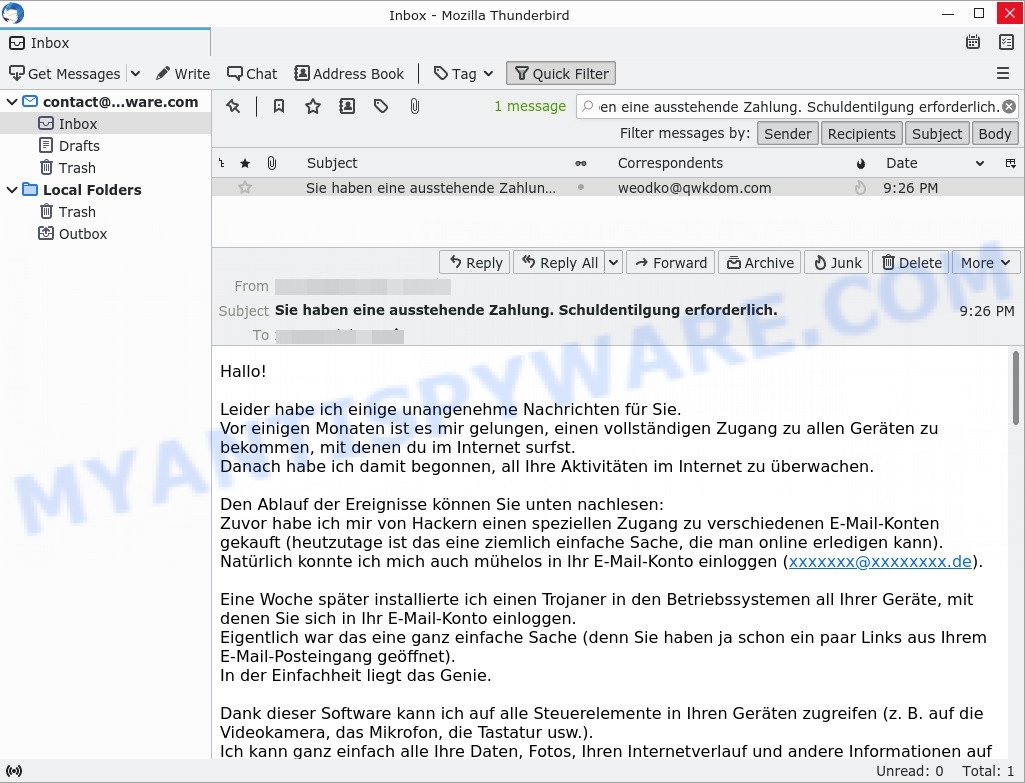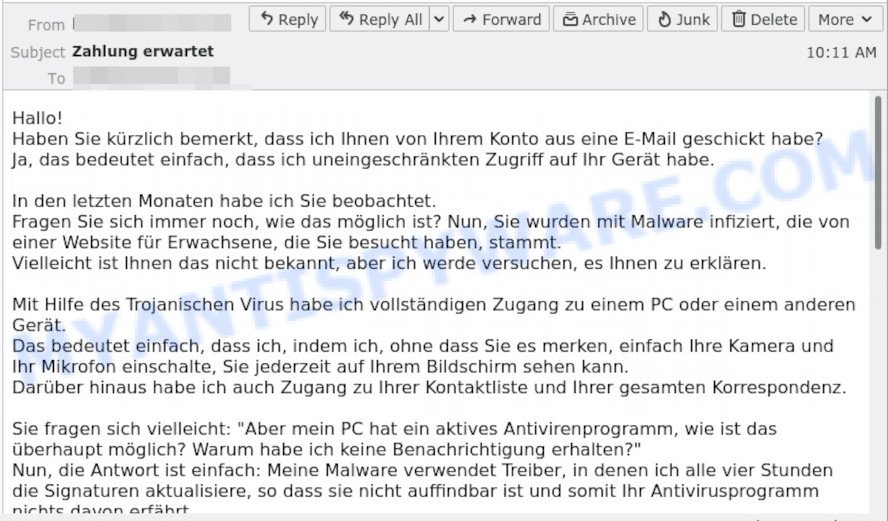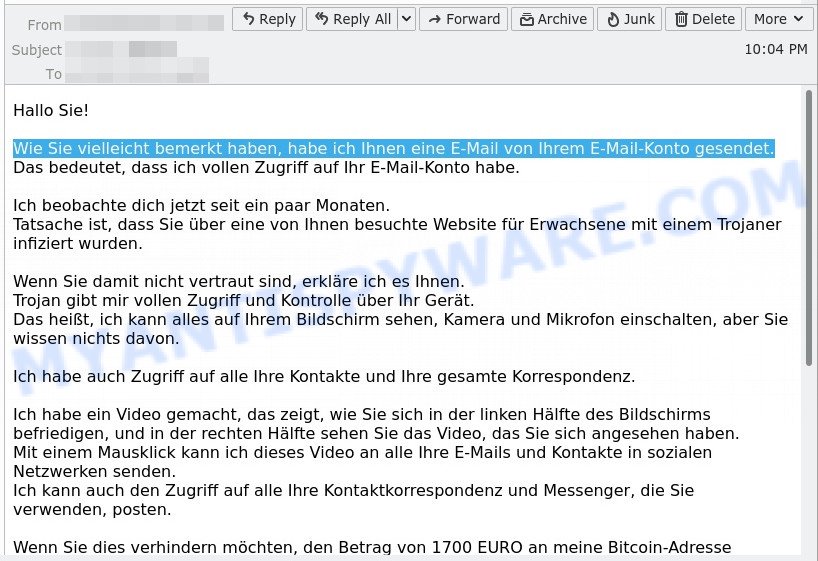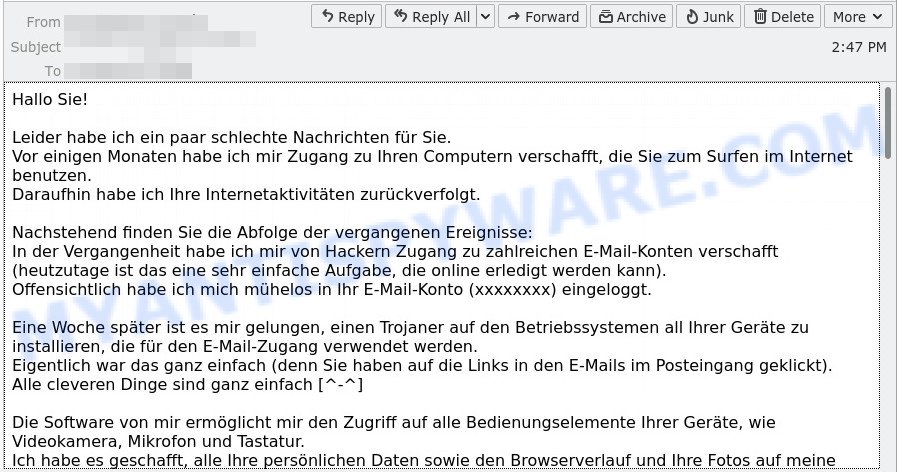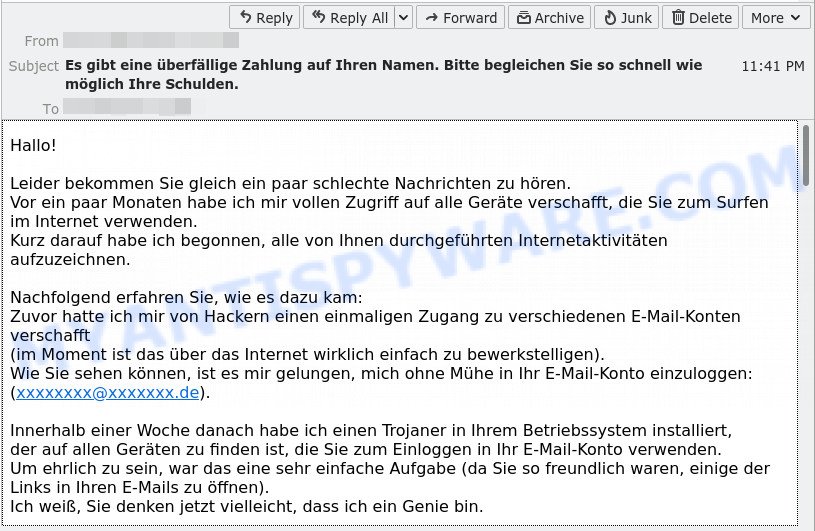The “Ihre persönlichen Daten sind wegen des Verdachts auf schädliche Aktivitäten nach außen gelangt.” is a scam email that’s a German version of the well-known ‘Your personal data has leaked due to suspected harmful activities‘ Email scam, which started circulating about a month ago. The scammers have translated the message to target German-speaking people.
Here’s an example of the “Ihre persönlichen Daten sind wegen des Verdachts auf schädliche Aktivitäten nach außen gelangt” Scam Email:
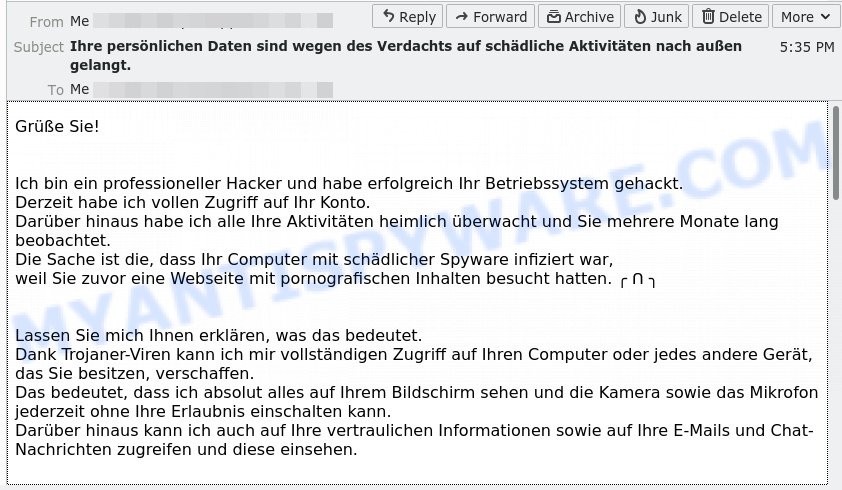
This scam is a type of ‘sextortion’, where the sender claims to have sensitive information about you and demands payment, usually in Bitcoin, to keep this information private. A typical “Ihre persönlichen Daten sind wegen des Verdachts auf schädliche Aktivitäten nach außen gelangt” scam email reads as follows:
Grüße Sie!
Ich bin ein professioneller Hacker und habe erfolgreich Ihr Betriebssystem gehackt.
Derzeit habe ich vollen Zugriff auf Ihr Konto.
Darüber hinaus habe ich alle Ihre Aktivitäten heimlich überwacht und Sie mehrere Monate lang beobachtet.
Die Sache ist die, dass Ihr Computer mit schädlicher Spyware infiziert war,
weil Sie zuvor eine Webseite mit pornografischen Inhalten besucht hatten. ╭ ᑎ ╮Lassen Sie mich Ihnen erklären, was das bedeutet.
Dank Trojaner-Viren kann ich mir vollständigen Zugriff auf Ihren Computer oder jedes andere Gerät, das Sie besitzen, verschaffen.
Das bedeutet, dass ich absolut alles auf Ihrem Bildschirm sehen und die Kamera sowie das Mikrofon jederzeit ohne Ihre Erlaubnis einschalten kann.
Darüber hinaus kann ich auch auf Ihre vertraulichen Informationen sowie auf Ihre E-Mails und Chat-Nachrichten zugreifen und diese einsehen.Vielleicht fragen Sie sich, warum Ihr Antivirusprogramm meine Schadsoftware nicht erkennen kann.
Ich erkläre es Ihnen kurz: Ich verwende eine treiberbasierte Schadsoftware, die ihre Signaturen alle 4 Stunden erneuert,
so dass Ihr Antivirusprogramm sie nicht erkennen kann.Ich habe eine Videozusammenstellung erstellt, die auf der linken Seite die Szenen zeigt,
in denen Sie fröhlich masturbieren, während auf der rechten Seite das Video gezeigt wird, das Sie sich in diesem Moment angesehen haben…ᵔ.ᵔAlles, was ich tun muss, ist, dieses Video an alle E-Mail-Adressen und Messenger-Kontakte von Personen weiterzugeben,
mit denen Sie auf Ihrem Gerät oder PC in Kontakt stehen. Darüber hinaus kann ich auch alle Ihre E-Mails und Chatverläufe veröffentlichen.Ich denke, dass Sie dies auf jeden Fall vermeiden möchten.
Sie müssen daher Folgendes tun: Überweisen Sie Bitcoin im Gegenwert von 1750€ auf mein Bitcoin-Konto
(das ist ein ziemlich einfacher Vorgang, den Sie online nachlesen können, falls Sie nicht wissen, wie das geht).Im Folgenden finden Sie die Informationen zu meinem Bitcoin-Konto (Bitcoin-Wallet): 1Er1bTsfVpy2uZ88hBDJf1i66SuYxQCRKb
Sobald der erforderliche Betrag auf meinem Konto eingegangen ist,
werde ich all diese Videos löschen und ein für alle Mal aus Ihrem Leben verschwinden.Bitte stellen Sie sicher, dass Sie die oben genannte Überweisung innerhalb von 50 Stunden (2 Tage +) durchführen.
Ich werde eine Benachrichtigung erhalten, sobald Sie diese E-Mail öffnen, und der Countdown beginnt.Glauben Sie mir, ich bin sehr vorsichtig, berechnend und mache nie Fehler.
Sollte ich feststellen, dass Sie diese Nachricht an andere weitergegeben haben, werde ich sofort damit beginnen, Ihre privaten Videos öffentlich zu machen.Viel Glück!
Sextortion scams are increasingly common online. They typically involve a threat to release embarrassing or sensitive information unless a payment is made. The scam often starts with an email that claims the sender has compromising images or videos of you, supposedly obtained through hacking. The scammer then asks for money in cryptocurrency to a specific wallet address.
If you receive an email that starts with “Ich möchte dich über eine sehr schlechte Situation für dich informieren” or anything similar, it’s important to not panic and to avoid sending any money to the bitcoin address provided. Instead, carefully review the email and consider if it’s credible. Keep in mind that scammers will often use tactics such as urgency, threats, or promises of confidentiality to trick victims into sending money. For more information about sextortion scams and how to protect yourself, read our article on the Your personal data has leaked due to suspected harmful activities Email Scam.
In conclusion, it’s crucial to stay informed and to be cautious when receiving any emails that demand payment to a bitcoin address. Remember that scammers are always looking for new ways to trick people out of their money or personal information. By being vigilant and educating yourself about these types of scams, you can protect yourself and help prevent others from falling victim to them.
Examples of such scams
As we have already reported above, there are other variants of scams aimed at German users, for example: Hallo mein perverser Freund, Ihr System ist gehackt, Ich bin ein professioneller Hacker, and Ich Ihnen von Ihrem Konto aus eine E-Mail geschickt habe.
- “Sie haben eine ausstehende Zahlung. Schuldentilgung erforderlich.” Bitcoin Email Scam
- “Ich Ihnen von Ihrem Konto aus eine E-Mail geschickt habe” Sextortion Email Scam
- “Wie Sie vielleicht bemerkt haben” Bitcoin Email Scam (new version)
- The “Hallo Sie! Leider habe ich ein paar schlechte Nachrichten für Sie” message is a new EMAIL SCAM
- “Es gibt eine überfällige Zahlung auf Ihren Namen. Bitte begleichen Sie so schnell wie möglich Ihre Schulden.” is a Bitcoin Email Scam
Each of these scams plays on fear and urgency to trick you into acting against your best interest. Always approach such emails with skepticism, verify your security, and do not engage with the scammers.
Threat Summary
| Name | ‘Ihre persönlichen Daten sind wegen des Verdachts auf schädliche Aktivitäten nach außen gelangt’ Email Scam |
| Type | Phishing/Sextortion |
| Ransom amount | 1750 Euro (in Bitcoin equivalent) |
| Bitcoin Address | 1JuQpPQjYcpuTugMh4RJ5R7YPQCqjzuyh3 |
| Fake Claims | Compromised data, webcam access, malware/backdoor installed |
| Damage | Psychological distress, potential financial loss if ransom is paid |
| Distribution | Mass emailing, likely from a purchased or hacked email list |
| Tactics | Fear induction, urgency, deception |
| Variations | Different ransom amounts, varying email content, alternative cryptocurrencies for payment |
| Prevention Tips | Use strong, unique passwords; enable two-factor authentication; be skeptical of unsolicited emails; never pay ransoms |
| Reporting Info | Forward to the Anti-Phishing Working Group at reportphishing@apwg.org; Report the scam to relevant authorities (e.g., FTC); Share information about the scam with friends and family to raise awareness; Monitor online accounts for any suspicious activity |
